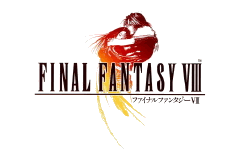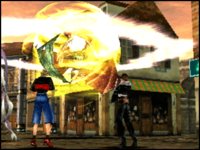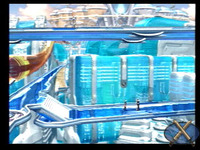|
|

|
PLATFORM
|
PlayStation
|
BATTLE SYSTEM
|

|
INTERACTION
|

|
ORIGINALITY
|

|
STORY
|

|
MUSIC & SOUND
|

|
VISUALS
|

|
CHALLENGE
|
Moderate
|
COMPLETION TIME
|
20-40 Hours
|
|
OVERALL

|
+ Fascinating, unheard-of concepts in combat
- Getting good magic to Junction is arduous
- Inventory management is constant and unpleasant
- GFs are more important than the actual characters
- Disjointed, bizarre, nonsensical, insane story
- Lengthy, mandatory combat animations
|
Click here for scoring definitions
|
|
|
Final Fantasy VIII picked up a lot of love and hate. The game set out to break most of the usual RPG rules, and succeeded in accomplishing that task. It notably failed to make the new rules a lot of fun, and its attempted innovations have not been stolen by other developers over the years. Final Fantasy VIII is not quite on the level of Lunar: Dragon Song when it comes to unpleasant experimentation, but merely making the comparison is a bad sign. It's akin to saying that being sprayed with napalm is better than having a nuclear weapon drop on your house, since the odds for survival are slightly better with the former.
Among the many innovations Final Fantasy VIII offers, the Guardian Force (GF) system is quite important. Characters do gain levels and experience, but their individual abilities are almost nil without GFs equipped to offer statistic augmentation. GFs gain experience separately from the nominal stars of the game, and learn abilities that are essential to success. The result of upgrading the summoned monsters' power is that their presence is vital, and switching them around to be affixed on the current party members unavoidable. Simply getting experience for the party members in battle is completely useless when enemies level alongside them, making the maintenance of GFs the key to winning battles.
Final Fantasy VIII's Junction system has also gained its share of infamy. Once a GF learns the abilities to enable this aspect of the game, characters can equip magic spells to their statistics, augmenting them greatly. This idea is intriguing in theory, but its execution argues that Squaresoft had insufficient play testing. Obtaining the spells to Junction is time-consuming no matter which method is used, and in particular any that must be drawn from enemies demand a high tolerance for painful and repetitive tasks. Creating spells via GF abilities is usually faster, but still requires a lot of tiresome drudgery to sort through the plethora of possible component parts that form new magic. A further inventory irritation comes when a lot of spells are accumulated on a character, as there is a limit of thirty-two when far more spells exist to be drawn. Spells cannot simply be discarded, they must be either transferred to another character or refined into something else, further frustrating any attempt to manage this aspect of the game quickly. Irritations piled onto frustrations, complete with time-consuming drudgework, equals an experience that is most unpleasant.
The GFs can also be used for direct action in combat by summoning them. Some of them have an option called Boost, which means that by hammering a button during their lengthy summon animations, the attack's power is increased. Not all GFs use attacks that can be Boosted, and even those that do never offer the option to have the game use the default strength in exchange for skipping the pyrotechnics. Particularly in the early parts of the game, GF attacks are the most effective means of killing the enemy, and using them slows skirmishes down enormously. The old axiom "damned if you do, damned if you don't" applies in full measure to this display of how proud the animators were of their work.
 Looks kinda like covering the enemy in egg yolk, but not quite as hard to clean.
Looks kinda like covering the enemy in egg yolk, but not quite as hard to clean.
|
|
Upgrading equipment is not vital, but anyone attempting to accomplish this task will be sent on fetch quests. To upgrade a character's weapon, first the new implement must be read about in a magazine, then the items necessary to synthesize it must be collected. This requires finding the right enemies and hoping they give up the necessary materials, a recipe for aimlessly getting into a lot of otherwise unwanted random battles. Ignoring the weapon upgrades is definitely an option, though that requires good fortune in obtaining the best spells to Junction for strength increases. Finding the magazines that enable weapon upgrades in the first place is a fetch quest, and obtaining the materials to make new weapons is a longer fetch quest, in a game that discourages aimless battles for the purpose of grinding. Climbing over a pile of broken glass in the hope of getting a cookie is a reasonable simulation of the experience.
After all of the convention-defying organization is done, actual combat plays out with the same Active Time Battles seen in other SNES and PS1 Final Fantasy titles. The Draw mechanic makes combat take a very long time if it is used, but otherwise the game exercises the same strengths of its predecessors. ATB was nothing new by the time Final Fantasy VIII came out, so its functionality is unsurprising. The wrinkle of money being obtained via a regular salary instead of combat is not a bad idea, and works fairly well.
In Final Fantasy VIII, the story of Squall, the uncommunicative loner, is told. His tale encompasses mercenaries aiding incompetent revolutionaries, flying educational edifices, a sorceress kept in extraterrestrial suspended animation, a truly surprising connection between most of the main characters, a story of love that supposedly transcends the ages, and Time Compression. In and of themselves, most of these ideas could turn into worthwhile plot elements. Unfortunately, that is not what happened.
The story of Final Fantasy VIII has attained infamy for its dazzling incompetence. Individual elements of the plot are somewhat interesting, such as the effort to give Squall a complex personality, and the assassination attempt upon Edea. The best of intentions fall apart quickly when it comes to the frequent appearances of deus ex machina in an effort to resolve things the writers could not deal with in any other way. So many things appear to have been thrown in at the last moment, so much dialogue is just plain goofy, so often do worthwhile concepts get ignored or given short shrift, that it almost appears an actual team of monkeys at typewriters was doing the work.
 Somehow Esthar gives off a Mega Man X vibe in its look. No Maverick Robots are on the loose in this city, at least.
Somehow Esthar gives off a Mega Man X vibe in its look. No Maverick Robots are on the loose in this city, at least.
|
|
Nobuo Uematsu turns in a mixed bag for Final Fantasy VIII's soundtrack. The good tracks are very good, but several are rather short and repetitive. His music is never unpleasant, at least, save with Faye Wong's rendition of the love theme "Eyes on Me," which is still less horrid than "Endless Love."
The visuals are a dramatic improvement over Final Fantasy VII, with landscapes that are not a constant chore to navigate. The FMV sequences in particular demonstrate the eye candy that Squaresoft was known for delivering, but the graphics throughout the game show off the PS1's capabilities. The system would be pushed harder in Final Fantasy IX, but VIII has aged better than many PS1 games.
Though not a particularly difficult game, Final Fantasy VIII will be a lot easier if inordinate amounts of time are spent obtaining great Junction magic. Simply trying to blast through it with minimal thought will result in a very frustrating experience. As the series was known for, ample amounts of optional material are present to be partaken of by those seeking to eke more playtime out of the game.
It is easy to admire Final Fantasy VIII's intentions from a distance. It tried to turn most of the RPG genre's conventions into something different, which could have been a great success. Admiring the game while playing it is a far more difficult proposition, however. Some have done it anyway, but I am most assuredly not among them. Drawing Aura from Seifer fifteen times and still getting less than forty of it was plenty to eliminate any residual urge to praise the game.
Review Archives
|









